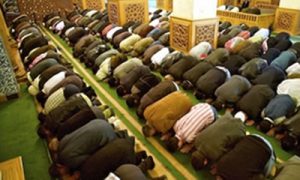The obligatory (fard) Prayer in Islam includes the five daily prayers and the weekly noon congregational prayer; Friday Prayer. Failure to observe these prayers on time is a serious and punishable sin.

It is a convention for the Muslims to reassure themselves, confirm their religious bonds and social solidarity.
The Islamic congregation is a positive answer to the acutest problems of humanity rising from racial discrimination, social castes and human prejudices.
In the congregational service of Islam, there is no king or subject, rich or poor, white or colored, first or second class, back or front benches, reserved or public pews. All worshippers stand and act shoulder to shoulder in the most disciplinary manner regardless of any worldly considerations.
The Friday Prayer (Salatu Al-Jumu`ah)
This weekly convention of Friday Congregation is compulsory upon every Muslim who is required to observe the other prayers and has no reasonable excuses to abstain.
It falls on Friday of every week and is especially important because:
1- It is the occasion earmarked by God for the Muslims to express their collective devotion.
2- It is an appointment to review our spiritual accounts of the week gone by and get ready for the following week just as people do in any other business.
3- It is a convention for the Muslims to reassure themselves and confirm their religious bonds and social solidarity on moral and spiritual foundations.
4- It shows how the Muslims give preference to the call of God over and above any other concern
Muslim of the Daylight Saving time zones seem to run into some difficulties and confusion over the proper time for the Friday Congregational Prayer (Jumu`ah). The problem can be solved easily by setting the prayer time between 1:15 to 2.30 p.m. throughout year.
In this way there will be no need to change the time from winter to summer. We strongly recommend this to our brethren so that they may work it into their weekly schedules as a permanent arrangement.
The Highlights of the Friday Prayer
This prayer of Friday is marked by these features:
1- Its time falls in the same time as that of the noon prayer (Zhuhr Prayer), and it replaces the very same prayer.
2- It must be said in a congregation led by an Imam, no single person can offer it by himself.
3- If any person misses it, he cannot make up for it; Instead, he has to offer the noon prayer, the original prayer which this service normally replaces
4- All kinds of normal work are allowed on Friday as on any other week day. For Muslims there is no Sabbath. They can carry on with their usual duties and activities provided they come to the congregational service in time. After the service is over, they may resume their mundane activities.
5- This Friday prayer must be performed in a mosque, if there is one available. Otherwise, it may be said at any gathering place e.g. homes, farms, parks. etc.
6- When the time for prayer comes, the adhan is said, the Imam stands up, facing the audience and delivers his sermon (khutbah) which is an essential part of the service.
Muslims are recommended to offer Sunnah prayers before the sermon. As for those who will arrive at the mosque during the sermon they should offer the two brief units of the Sunnah prayer “Tahiyatu Al-Masjid” (Mosque greetings) and then sit down to listen.
While the Imam is talking nobody should talk, everyone present should take a sitting position and listen to the sermon quietly to the end
7- The sermon (khutbah) consists of two parts each beginning with words of praise of God and prayers of blessing for Prophet Muhammad (peace be upon him). In the first part some Qur’anic passage must be recited and explained for the purpose of exhortation and admonition.
At the end of the first part the Imam takes a short rest in the sitting posture, then stands up to deliver the second part of his sermon. General affairs of the Muslims may be stated in either or both parts of the sermon. In the second part, especially, the Imam prays for the general welfare of all Muslims
8- After that, the Iqamah is made and the two obligatory units are offered under the leadership of the Imam who recites Al-Fatihah and the other Qur’anic passage in audible voice. When this is done, the prayer is completed. After that, Sunnah prayers may be offered individually in a low voice.
The Sunnah prayers may be offered at home. Also they may be replaced with some obligatory prayers that one has missed in the past and for which one has to make up.
Any participant in the Friday weekly congregation or `Eid Prayers should do his best to be neat and tidy.
Though there is no compulsory reason for a complete ablution, a bath is strongly recommended as it makes one fresher and more pleasant.
_________________________
The article is excerpted from the author’s well-known book “Islam in Focus”.
 Arabic
Arabic English
English Spanish
Spanish Russian
Russian Romanian
Romanian Hindi
Hindi Tagalog
Tagalog Bengali
Bengali Sinhalese
Sinhalese Nepali
Nepali

